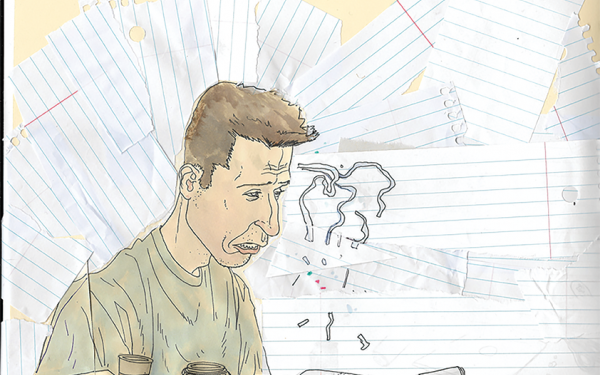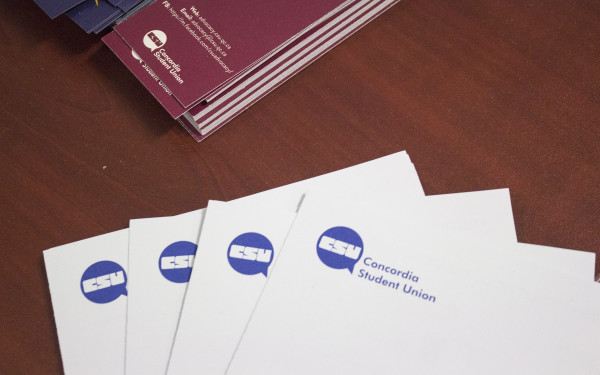CSU Referendum Questions Explained
Confused About the Referendum Questions? Here’s What They Mean
The upcoming Concordia Student Union by election includes a few referendum questions that could significantly affect you. Whether you’re confused by the wording, or lacking the proper context, here’s a brief explanation of each question to help you make an informed decision.
Fall Reading Week
A working group has been assessing the issue of a fall reading week following a March 2019 presentation by undergraduate students to the Concordia Senate.
To accommodate a fall reading week, the semester would either have to start earlier—no earlier than Aug. 28—or be cut down from 13 to 12 weeks. The latter option could cause issues when it comes to the accreditation of certain programs. One of them would be engineering, according to Isaiah Joyner, external and mobilization coordinator of the CSU, as the program requires a minimum amount of contact hours.
The working group suggested that the issue be put to referendum in this election.
A majority yes vote would not guarantee a fall reading week, and the earliest that one could be implemented is fall 2021.
Food Waste Reduction Program
The Food Waste Reduction Program would aim to reduce the amount of food waste at Concordia by establishing a program to redistribute leftover food from events to students or charitable organizations.
Online Opt-out
The online opt-out referendum question, a key promise from the Cut the Crap campaign, seeks to implement a method for opting out of optional fee levies online.
Currently, students can opt out of fee levies by individually contacting each group and requesting a refund.
However, a majority yes vote would not automatically lead to an online opt-out system.
According the Christopher Kalafatidis, general coordinator of the CSU and supporter of the Yes campaign, the system would be developed with the fee-levy groups.
It’s unclear how the system would be implemented and if the CSU actually has the authority to do so.
According to Emily Carson-Apstein, external coordinator of Sustainable Concordia and supporter of the No campaign, the university would have to be consulted first. They also said the university told them it would not implement this sort of system in the student portal.
Fee Levy groups are concerned such a system would lead to a significant decrease in funding that would affect their operations. Fee levy groups include The People’s Potato, Cinema Politica, and The Link among many other organisations.
Recreation and Athletics Fee
The recreation and athletics department is requesting an increase of their fee levy from $2.92 per credit to $5 per credit—$75 per semester for a full course load.
The fee has not changed in several years, and this increase would bring it in line with other Quebec universities.
The benefits to students would include 50 per cent off Le Gym and PERFORM Centre memberships, free access to Le Gym in the summer, and free access to Stingers games.
It would also permit the department to take on more clubs under the Stingers banner, such as the tennis club, according to Kathleen DiCaprio, the department’s marketing manager.
She also said that for less gym-inclined students, there would be an increase in informal recreation options such as ping-pong tables.
Sports Shooting Club
The Concordia University Sports Shooting Association was given probationary club status by the CSU Clubs and Space Committee for the academic year on Sept. 9. That decision was later revoked by council, which proposed the question be put to referendum due to the controversial nature of the club.
A majority yes vote would formally recognize the CUSSA as a CSU club, granting them access to funds under the Clubs and Space Committee.
Council Change
Another Cut the Crap referendum question, this proposes to change the allocation of CSU council seats. It was originally called the “faculty equality” question.
The current allocation gives 13 seats to arts and science, seven to JMSB, five to Gina Cody, three to fine arts, and two to independent students. This allocation is based on the size of each faculty’s student body.
The proposed allocation would change this to a fixed three seats per faculty, with arts and science split in two, and one independent students seat. It would not take into account any change in the enrolment in faculties and would reduce the amount of councillors from 30 to 16.
Clubs and Space Fee Levy Increase
The CSU is requesting a $0.08 per credit increase to its fee levy to allocate to the Clubs and Space Committee, effective winter 2020.
Clubs and space currently has a deficit of $1,505 and is no longer able to fund any clubs. The committee’s fee levy had previously been cut by the CSU because it had posted a surplus in 2017. The university also pulled significant amounts of funding after it realized it had over allocated funds to the committee.
They also attribute some of the issues to financial mismanagement, as well as a significant increase in the number of clubs.
The Clubs and Space Committee believes this increase would eliminate their deficit and make them sustainable in the long term.

_900_642_90.jpg)


_900_642_90_600_375_90_s_c1.jpg)


